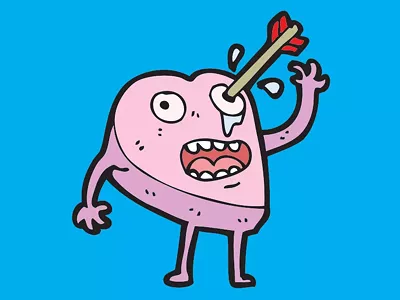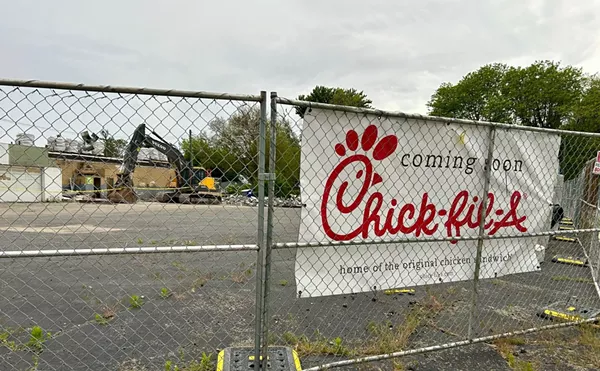
Audio By Carbonatix
[
{
"name": "GPT - Leaderboard - Inline - Content",
"component": "35519556",
"insertPoint": "5th",
"startingPoint": "3",
"requiredCountToDisplay": "3",
"maxInsertions": 100,
"adList": [
{
"adPreset": "LeaderboardInline"
}
]
}
]
Well, I guess we have to get to know our presidential candidates somehow. This week, we tried the “Siamese Byzantine” method. That is the phrase old Howard Crane, the architect, used to describe the Fox Theatre when it opened in 1928, and that pretty much sums up Sunday’s presidential candidates’ show on its stage.
I was going to go to the affair — calling this a “debate” was something like calling a stroll through the Cass Corridor “looking for love” — but decided at the last minute to watch it on television, the way normal humans would. I wanted to try to imagine what a viewer might take away from it, without benefit of propaganda from the spin doctors.
What they actually saw was a free-for-all in which individual candidates were asked questions, many of which weren’t very good, or put very well. Moderator Gwen Ifill told Dennis Kucinich that she had done her research, and the only member of the House ever elected president was Abraham Lincoln. Even the candidate knew it was really James Garfield.
The worst thing about the format was that everyone didn’t get a chance to chime in on key policy questions. A questioner could ask Howard Dean what he thought of the war, and then someone might ask John Kerry what he’d do about trade, etc.
So basically, it was a combination of beauty contest and Public Speaking 101. And here’s what I think was clear to viewers after 90 minutes of this sort of thing:
• President George Bush the lesser has had a marked fashion influence in ties. Most of the candidates wore ties close to his preferred shade of medium blue.
• Without any doubt, the Rev. Al Sharpton “won” the “debate.” He was the best speaker and has a gift for rhetoric that can outshine Jesse Jackson. His line, “Why are we told that it is an honor for the poor to die for their country [while] it is a burden for the rich to pay their taxes to the country?,” was the best of the night.
• Unfortunately, Sharpton is not a credible candidate for president of the United States. Neither is Carol Moseley Braun, a failed one-term senator who is the weakest of the candidates by virtually every measure, especially fund-raising.
• Dennis Kucinich, a congressman from Ohio, does a pretty good job of presenting the positions of those on his party’s peace/left-wing, though he also has no chance to win the nomination, and wouldn’t even if he didn’t look like a Serbian leprechaun. He was a disaster many years ago as mayor of Cleveland. His bizarre statement that there were 300 murders in Detroit in September (there were actually 33) provided a glimpse of the old Dennis the Menace.
That leaves the Big Six: U.S. Sens. John Edwards, Kerry and Joe Lieberman; Wesley Clark, the general, Dean, the former Vermont governor, and Dick Gephardt of Missouri, the former House Minority Leader.
• Gephardt, who in his younger days had a plastic pretty-boy look about him, looked like a corpse that had been worked on by the embalmers. He generally lacked spontaneity. When asked if time had passed him by he said no, he thought this was his time now, but it sounded as if even he didn’t really believe it.
• John Kerry was the early favorite. He has the sort of record one used to expect from a presidential candidate — military service, multiple Senate terms, etc. However, it has since become apparent that he would be incapable of exciting voters. He has a hangdog, craggy appearance, bordering on the creepy. Geoffrey Fieger, in the funniest observation of the campaign so far, says Kerry “looks French to me.”
• Joe Lieberman looks and sounds sort of like a caricature of a candidate, sort of a mini-pol. His candidacy is based on his vice-presidential bid last time. Will Democratic primary voters, a high percentage of whom are black, opt for an Orthodox Jew who has neo-Republican economic ideas? Next.
• John Edwards is easily the prettiest of the candidates, a lightly Southern-fried JFK. This time he did better than in past appearances, at least for the 40 seconds or so he got to talk. He was about the only one who came close to articulating a positive agenda to make this a better country, primarily by making higher education universally available.
• Howard Dean, the apparent front-runner, seemed to be something of a nonentity in this debate. When seen, he looked, as usual, smug, slightly condescending, and utterly humorless. He made Al Gore look like someone you’d like to bowl with. Do Democrats really want to try running someone who people find hard to like? Again?
• Wesley Clark wore the shiniest suit and a power-red tie on a glaring white shirt; blue would have worked much better, thank you. Nevertheless, he seemed powerful, energetic, in command. The retired general effectively parried charges that he wasn’t a good general, or a real Democrat, etc.
Overall, my impression was that a ticket with some combination of Edwards and Clark might be strongest. The next election will be decided in the suburbs, where the working middle class lives. Many of those folks are increasingly uneasy with the nation’s future. But as it now stands, unless the Dems find a message more compelling than “Bush is bad,” any of the gang of nine will have a hard time making the sale.
Clarification: Several readers objected to my characterization of Monica Lewinsky last week, when I noted that Bill Clinton was impeached essentially for fumbling around “with a fat girl eager to fumble around with him.” They thought it was anti-feminist. I put it that way to highlight the utter tawdriness of his behavior and the triviality of the charge. Incidentally, I am (sadly) fatter than she.
Jack Lessenberry opines weekly for Metro Times. E-mail letters@metrotimes.com




